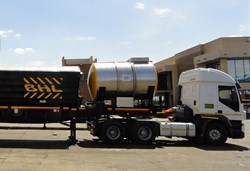
Top stories


ESG & Sustainability#BudgetSpeech2026: SRD grant unchanged, other Sassa social grants see hike
10 hours



More news












ESG & Sustainability
South Africa’s carbon tax should stay: climate scientists explain why










One-way traffic is one of the biggest contributors to logistics costs, so ensuring that trucks never travel empty creates an immediate saving. This is borne out by the experience of Buks van Rensburg, co-owner of Cargo Carriers' Zambian subsidiary Buks Haulage Limited (BHL). Established in 2004, BHL has enjoyed consistent growth in the Zambian and sub-Saharan transport sector, aided by the ability to carry return loads on most contracts, through an innovative trailer configuration.
"For example, our tankers carry copper concentrate from mine to smelter using a tipper," says Van Rensburg. "At the smelter, they load sulphuric acid, which is a smelting by-product using the tanker component of the trailer, and deliver it back to mines where it is used in leaching during copper processing." By ensuring that tankers are carrying cargo on almost every journey, BHL is able to offer more competitive pricing than it would otherwise.
The secret is that whichever direction the trailers are going, the load is always equally configured over the axle, thus complying with safety and road regulations, and reducing the wear and tear on the road surfaces and tyres.
BHL has also been using unique tanker-tipper combination trailers for two and a half years, built specifically to Van Rensburg's design. The multi-purpose trailer concept is not new, but BHL's Bucksta has a side-by-side configuration of tankers and tippers, which avoids the loading and structural problems experienced by other designs. The tippers are equipped with galvanised hydraulic covers, offering protection against theft and the elements. With tankers and tippers combined on one trailer, BHL is able to transport liquid and dry bulk cargo on return routes or simultaneously, delivering another logistics saving.
African roads present haulers with extremely variable conditions, so the trucks pulling the trailers need to meet those challenges if a company is going to maintain any kind of reputation for reliability. This is the reason that BHL, when upgrading its fleet earlier this year, opted to buy 80 FAW trucks from China, rather than a European manufacturer.
"We can service and maintain the vehicles in our own workshops," Van Rensburg says. "The majority of the latest European models are intensely computer-based and you need computerised diagnostics and expensive spares to maintain them. That's just not practical in an African environment; you can end up with enormous down-time on each vehicle. So we saved time and money by opting for trucks that do not require digital diagnostic infrastructure and specially trained technicians to maintain them. We are saving 8% on fuel and are running at over 90% utilisation compared to our 65% utilisation on the more sophisticated European fleets. This translates to lower costs on top of the savings generated by return loads. These cost savings and the higher levels of reliability make the combination hard to resist."
Already active in Zambia, the DRC, Namibia and Angola, BHL is planning continued expansion into sub-Saharan Africa, particularly in the mining and farming sectors who also have a need for flexibility on return loads. It is a fast-opening market, with African growth in general still outpacing many developed nations.